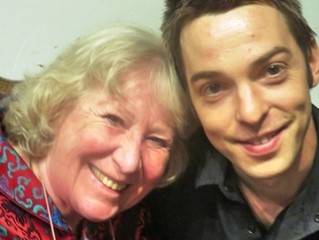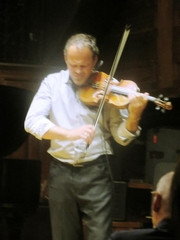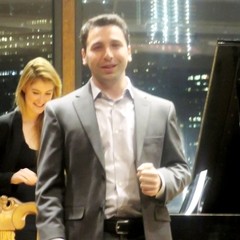|
Back
The Circus of Unending Delights New York
BargeMusic
08/31/2016 - & September 2, 3, 4, 2016
“Here And Now” Labor Day Festival
Gregor Huebner: Yoruban Fantasie for Violin and Electronics (World Premiere)
James Nyoraku Schlefer: 2Blue for Shakuhachi and Viola (Premiere)
Paul Frucht: Reckoning for Cello and Piano (World Premiere)
David Shohl: WTF Goldberg Canons for two Keyboard Manuals (World Premiere)
David Taylor: Concertino No. 2 for Bass Trombone, Piano, Contrabass and Percussion (World Premiere)
Daron Hagen Cantabile for Koto and Cello (NY Premiere)
W.T.F. Bach: Dash Underscore Dash (World Premiere)
Frederic Rzewski: Rising (US Premiere)
Gregor Huebner (Violin), James Nyoraku Schlefer (Shakuhachi), Eva Gerard (Viola), Ursula Oppens, Marika Bournaki, W.T.F. Bach, Roy Stabinsky (Pianos), Julian Schwarz (Cello), David Taylor (Bass trombone), Matthew Elliot (Contrabass) Kevin Shea (Percussion), Duo Yumeno: Yoko Reikano Kimura (Koto), Hikaru Tamaki (Cello)

U. Oppens, W.T.F. Bach (a.k.a. D. Shohl (© Samuel A. Dog)
If Cirque du Soleil decided to create their next colossal show based on “serious” music, on a medium-sized stage atop a barge in the East River, their plans would be comfortably accomplished with the annual template of BargeMusic.
Each Labor Day weekend, Artistic Director Mark Peskanov brings together a good dozen living composers, two-dozen virtuoso performers, and premieres that give new meaning to the word eclectic. Last night, the “Here And Now” Labor Day festival presented one work of Japanese koans, one with a Japanese poem, an East European version of Stéphane Grappelli redux, a kind of French-fried Bach partita, a whole concerto for bass trombone, the premiere of a work by Frederic Rzewski played by his own favorite pianist. And just for the hell of it, a fantasia-like long work for cello and piano which could have been written by Robert Schumann resurrected in the year 2016.
While the exotic instruments took center stage, three pianists stood out. Ursula Oppens, for whom Mr. Rzewski wrote his massive The People United played another fantasy, this on the Irish Foggy Foggy Dew. Hardly in his more monumental mood, but with that same facility, that same lucidity on keyboard which Ms. Oppens played with such seeming ease.
Another pianist has the sobriquet “W.T.F. Bach” (And don’t get the wrong idea. I am certain the “F” stands for the great 18th Century contrapuntalist Josef Fux). Giving the game away, David Shohl composed for his nominal doppleganger Mr. Bach the WTF Goldberg Canons for one keyboard and one electronic toy keyboard on the piano. Mr. Shohl developed the most intricate, mathematically perfect, non-parodistic series of canons on both manuals, that one feels Angela Hewitt could inject it in her own Bach repertory. And while the harmonies skirt 2016, they were so deft that few in the audience would know the difference.

G. Huebner (© Samuel A. Dog)
Two soloists in this musical Cirque du Soleil played so brilliantly that their own dexterity was greater than the music. Greg Huebner’s electric violin, connected to music which gave rhythms and reverbs, started with some vaguely Eastern European music, but quickly calibrated his solo instrument into jazz, plain and simple. The great jazz violinist Stéphane Grappelli needed his own ensemble (and once Yehudi Menuhin!) to make his points. Mr. Huebner did it with the help of a single fiddle.
One would hardly know from David Taylor’s informal, talkative, delightfully informal persona that he is one of the most accomplished and eclectic musicians in the world. Specifically the trombone, and more specifically because he has worked with composers like Hovhaness, Wuorinen, Perle, as well as Yo-Yo, Streisand, Gil Evans, Charles Mingus and...well, everybody else in the classical and jazz world.
Listening to his four-movement Concertino for Bass Trombone, Piano, Contrabass and Percussion was like listening to Ursula Oppens on piano. It was a master at work. The slightly jazzy but beautifully laid-out chamber work did go on a bit, but Mr. Taylor didn’t need any avant-garde techniques to make his point. It was big-band-style trombone style with a minimal chamber-group to support him.
Two works used Japanese instruments. James Nyoraku Schlefer is of course the most important American performer on the Japanese flute, and his 2Blue was a lovely duet with violinist Eva Gerard. Except that this was more than a duet. The “blue” portion was slightly bluesy, rakish, it was the austere Shakuhachi letting its nuanced hair down. And to me, this was the least important part of the work.
Rather, I fell in love with the long introduction. These were flute phrases, answered with violin phrase. The two played in consonance, the two instruments kneaded, blended, cushioned each other. And while the lines were purely musical, one heard voices, cryptic, with another language, another conversation.
It was (or could have been) the Zen monk offering koans to his acolyte, with answers that could never be right, but were never wrong, Zen fashion. The “blues” bit was a bit of a letdown.
Another work, by Daren Hagen, written for the koto-cello team of Reikano Kimura and Kikaru Tamaki, had two outer movements that were purely Japanese, including lines of poetry. The second movement could have come from an 18th Century sonata, with some delicate playing by Ms. Kimura.

M. Bournaki, P. Frucht (© Samuel A. Dog)
Each of these seven works were quirky, interesting, eccentric, delicious recipes for an enchanted evening on BargeMusic. Paul Frucht broke the mold with his Reckoning for piano and cello.
I called this before a “fantasia” only because I couldn’t trace the classical structure in this relatively long work. That, though, didn’t detract for its seriousness–a mid-19th Century mid-European seriousness from the young American composer. And while that may be unfashionable, such commitment, and such difficult dense, playing–executed with unfailing brilliance by cellist Julian Schwarz and pianist Marika Bournaki–that it gave the most worthwhile elevation to a evervescent evening.
Harry Rolnick
|